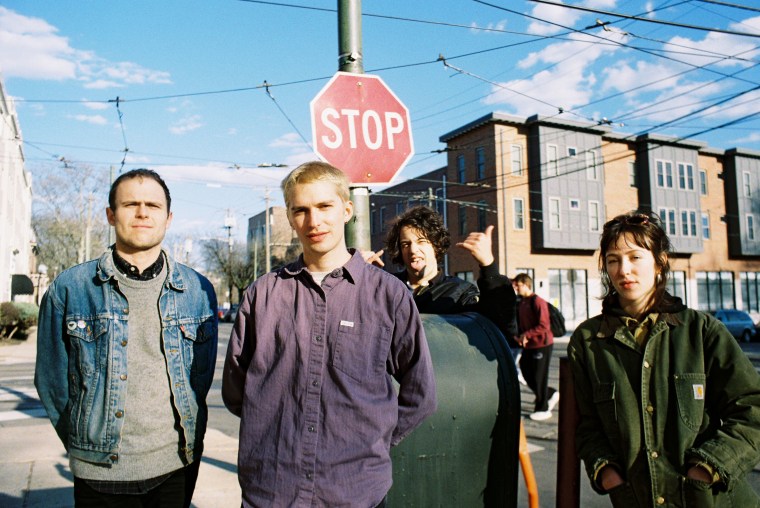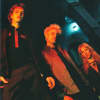 Photo: Melissa Brain
Photo: Melissa Brain
Philadelphia-based indie quartet Strange Ranger’s lush-sounding third album, Remembering The Rockets, is pockmarked by the apocalypse; anxious moments poke through in the middle of lead vocalist Isaac Eiger’s verses, then recede from view. “I think he's evil privately / Hold my tongue and do the dishes,” he sings over the summery pop-rock of “Sunday.” The breezy humming on “Pete’s Hill” is preceded by two troubled hypotheticals: “If I tried my best but killed again / If I hit your chest with gold cement.” On the fluidly synthetic “Living Free,” he thinks about a planet on fire and asks: “What if I just want a family?”
“It's hard for me to write a song that's about one event,” Eiger says over the phone from his girlfriend’s house in Philadelphia. “There are explicit references to wanting to have a family in a world that is not guaranteed to be the same, and latching onto that as a narrative is totally natural. But there are tons of lyrics on the album that are just about my relationships with the people in my life, just looking at the world. Climate change politics are a part of that.”
Recorded mostly at an ad hoc studio Eiger’s parents’ home in Montana, Remembering The Rockets — premiering in full below — upends the occasionally scuzzy and almost always fraught guitar rock that the band put out on their last two LPs, 2016’s Rot Forever (as Sioux Falls) and 2017’s Daymoon. A Korg M1 synthesizer finds its way onto most of the songs here, usually to warm the mix on instrumentals like “athens, ga” and “rockets” or to provide a dreamlike backdrop for the already uncanny lyrics. Bassist, keyboardist, and singer Fred Nixon, drummer Nathan Tucker, and occasional vocalist Fiona Woodman distort, harmonize, and augment around Eiger’s guitar, turning most of these songs into delicate, miniature hallucinations.
That often beautiful detachment from reality fits with Eiger’s perception of reality — half rooted in the day-to-day, half off in metaphor. “Planes move through the sky / I walk to work in fading light,” he sings over the hum of “Planes in Front of The Sun” before again projecting forwards and scaring himself out of it: “Daddies with their kids / I still want that / I still feel sick.”
Listen to Remembering The Rockets below ahead of its release this Friday, July 26, via Tiny Engines, and read The FADER’s interview with Eiger after the jump.
How natural was the move towards synths and away from a straightforward rock setup on this album?
It's definitely intentional. You'll listen to a few artists or bands or whatever for a little while, and then you find out about different stuff and start listening to that. I want to make music that sounds like this new thing that I just found out about. I get really frustrated or tired of something when we've been doing it too long, and I really just feel like we've done enough of this, and now we're listening to this new thing, whatever it may be. Naturally, the stuff I end up writing reflects whatever new thing I've been listening to.
What was it this time?
We were listening to a lot of Disintegration by The Cure, a lot of trip-hop — so some Massive Attack songs and Portishead. Things like Oneohtrix Point Never. I don’t know how audible it is, but I think we try to sneak some of that in there as much as we could. That Yves Tumor record [2018’s Safe in the Hands of Love].
There's a lot of anxiety and worry in the lyrics. Do you think you were drawn to those records for the same reason?
Lyrically I wasn't super influenced by those records. Sonically, and the style of songwriting, I was influenced by that style of music. But my favorite lyricists are Jason Molina from Songs: Ohia, old Mark Kozelek. My lyrical influences are a little different than the sonic and melodic influences. Are you familiar with Songs: Ohia?
Yeah, I’ve been listening to a lot of Songs: Ohia lately and getting very depressed.
Yeah! And lyrically he's just brilliant. I also love Andrew Savage from Teenage Cool Kids and Parquet Courts. But Jason Molina — God. There's so much there, and the imagery is so beautiful. It feels like he's being so honest, but it doesn't feel cloying. There's always this tension when you're writing, between trying to be earnest but having it still ring true, and I feel like Jason Molina was so great at that. It didn't feel like it was obfuscated by anything, it didn't seem like he was afraid of sincerity. But so much sincerity can feel silly and calculated, so I tend to like lyricists who can be sincere, but in a way that feels natural.
So what do you think is the key lyrical difference between this record and previous ones?
This narrative has already sort of developed, talking to interviewers and stuff about the record, [that] it's all about climate change and the collapse of civilization. I don't think the entire record's about that, but I think that's something that is explicitly alluded to in the record, in a way that it certainly was not on past records. I guess there's more of a real, larger-world focus to some of the lyrics on the record. On our first record, I was just going for putting it all out there, being as earnest as possible, airing all [my] grievances. The second record was a reaction to that. I remember thinking that I wanted it to feel the way things feel in a dream, where some things feel emotionally true without being logically true — I was trying to describe the way things felt rather than the way they actually were. I don't know how successful that was. With this record, I think, I was trying to be a little more exposed, but in a way that didn't seem silly and teenaged. The first record kind of feels like [it was written by] a teenager, being really mad. This record was an attempt to be honest without being on the nose in the way that a 16-year-old boy would be, and trying to not just have a super immature emotional perspective.
A lot of that is surely just natural — your attitudes towards things change as you hit your mid-20s. But you say it as if there's a conscious effort. How do you write sincerely and pull back from it being too earnest?
I think that's the hardest thing about writing lyrics — how to communicate how you really feel and have it not seem trite or like you're a try-hard. I'm embarrassed by a lot of the lyrics on our early stuff, but the songwriters that I've been listening to as I've gotten older have been really good at it. Andrew Savage is so good at communicating sentiments that are so rich with feeling, but it still seem artistic. Everything is in its place.
One thing that Andrew Savage is really good at is gracefully weaving together the personal and the political, which is a key part of Remembering The Rockets too.
I don't know what your background is like, but I grew up a white kid in Montana. Everything was pretty fine for me. I was a white teenage guy in a small town, and everything is basically okay. And then as things have gotten crazier politically, people like me who weren't exposed to the suffering — not that I'm suffering — but people who weren't exposed to politics as a real force in the world, I think, obviously in the last few years that has changed. And so, in the past I would have felt like it would have been really insincere for me to talk about the world, but now, since the world has come to meet people like me, these things are real. And climate change isn't just a specter anymore — it's happening, and it's killing people, and it's going to kill a lot more people. Those sorts of forces now actually do cause real, immediate, in-your-face anxiety and terror and fear, so I think personally that I can write about it in an honest way, because now I feel closer to it.
When you’re hit by that thought, is your instinct to start writing? Or does the anxiety prevent you from picking up a pen?
I definitely just try to write as consistently as I can. Normally when I write, it's really bad — you just sort of get used to that. But when I write something that I think is good, it's the best feeling ever, even if it's about something horrible. If something horrible happens to me or somebody I know and I can write something about it that feels real, it contextualizes how I feel for something, or it explains to me how I'm feeling. I write as much as I can know that that catharsis is going to be rare, but I just write a bunch of shit and sometimes it's kinda good.
I guess I'm just amazed that sometimes people are able to write about depression when depression, by definition, prevents you from wanting to do anything at all.
I get way more depressed if I feel like I'm not doing something that enriches my life in some way. I play video games and do all kinds of shit that is pretty meaningless, but I feel like a fucking loser if I don't feel like I'm going in the right direction with my life. I just start to feel really worthless, like I'm wasting my time, really lethargic. Trying to be active, creatively, is a coping mechanism for me, I guess. When you get too depressed, you can't really do that. But the rest of the time, if I'm sad but functional, I try to be as productive as I can be.
When you write about those real-world things, even in the most personal way, do you have to convince yourself that it can make a difference?
I never really know if I actually think art can change the world. I think movements and activism and action change the world. Putting too much faith in art to change the world kind of takes the responsibility off of that same person to go to a protest. I really think the idea of indie rock changing the world is kind of silly, but people do what they know how to do. The only thing I know how to make is music. I think that is the tool I have at my disposal to voice my concerns, but I don't have any illusions. Certainly our album wouldn't change anything. If Kanye West released an album that was about class war, maybe that would influence things. I think that political art is maybe symptomatic of larger social movements that are happening, but I don't think that political art will spur social movements.
How much do you think about how your music is perceived? Does it get into your head?
I definitely catastrophize about how it's perceived, and I feel like it never gets perceived in the way that you want it to. It would be healthy if I was like, I'm going to write this and then if people like it, they can like it for whatever reason they want. But I always feel like people — if they do like something we do — like it for reasons that I didn't really intend. No matter what you do it's going to be a little unsatisfying. I just feel like I'm sort of distrustful whenever anybody likes it. So yeah, clearly, I think about how things are going to be perceived. I try not to let it fuck up the writing process. I try to keep those things separate. I don't wanna be writing a lyric and be like, Fuck, this is going to look so stupid when it gets destroyed by whatever publication or gets made fun of by people. But at this point, when the record is done? Yeah, I worry and I wonder: Are people going to think it's dumb? Because it's not necessary at all. There's no reason to make an album, really, except you just want to. You're asking for it. Just: What is the point of this being here?


